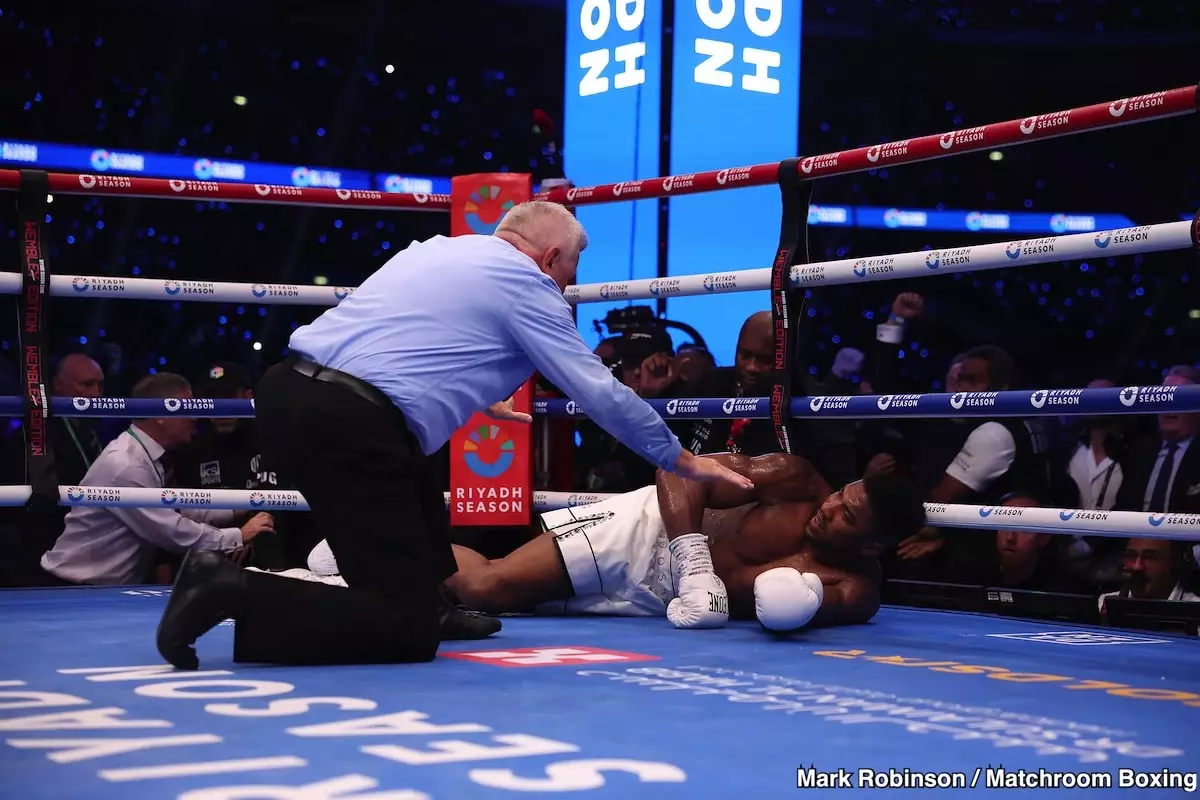In a highly anticipated clash that many hoped would be a display of Anthony Joshua’s prowess, the reality turned out to be quite grim. Joshua was faced with Daniel Dubois in London, coming off a string of successes and hopeful of proving doubters wrong. Yet, what unfolded was a poignant narrative of resilience intermingled with disheartening defeat. Eddie Hearn, Joshua’s promoter, expressed a blend of pride for Joshua’s tenacity and frustration over how the bout ultimately played out. The once-formidable heavyweight champion found himself knocked down several times, culminating in an unsettling, near-unconscious state that raised eyebrows and concerns among fans and experts alike.
Hearn’s reflections reveal a harsh truth: Joshua, despite his enduring spirit, appeared to be operating at a diminished capacity following a brutal first-round knockdown. This early setback seemed to ripple through the remainder of the fight, impairing Joshua’s ability to adequately respond to Dubois, who seized the opportunity to press his advantage. Could this momentous fall have derailed Joshua’s career trajectory? The aftermath of such a loss is often far-reaching, and the Boxing community is left to ponder what this means for the once-unstoppable force in the heavyweight division.
Despite the dire circumstances, Hearn was vocal about Joshua’s heart and perseverance. The ability of Joshua to continually rise from the canvas after being dropped multiple times is commendable and speaks to his character. In an era where fighters are often defined by their records, Joshua chooses to redefine success by exhibiting grit and determination. Hearn noted that it was not merely about taking punches; it was about Joshua’s unwillingness to capitulate to the overwhelming force of Dubois—even in severe threat of exhaustion and defeat.
The narrative of a fighter pushing through adversity is a powerful one, reverberating through the annals of boxing history. While fans may chime in with doubts about Joshua’s future in the ring, Hearn highlighted an essential truth: Joshua gave his all, illustrating that, regardless of the loss, there exists an element of valor in navigating such brutal challenges. Would this resilience be enough for a comeback? The boxing world remains divided on what the road ahead looks like for Joshua.
Hearn’s analysis post-fight brings attention to another crucial factor at play: Joshua’s physical preparedness. The notion of his bulky physique perhaps proving to be counterproductive was raised in discussions following the bout. Many analysts weighed in, suggesting that the added muscle mass left Joshua with decreased stamina, influencing his performance when the moment called for agility and defense. In boxing, balance is key; excessive muscle can hinder movement, which may have led to Joshua’s difficulty in evading Dubois’s powerful strikes.
Moreover, the apparent strategy of retreating under fire raised questions about Joshua’s mental fortitude during the fight. Hearn’s statement indicating that Joshua was at only “30%” after the first round plants doubt about whether this battle represented a one-off defeat or indicative of a deeper issue within Joshua’s boxing psyche. In a sport that often rewards explosive, graceful efficiency, were Joshua’s physical choices inadvertently setting him up for failure? The dynamics of preparation, strategy, and mental resilience coalesce into a critical pondering for Joshua as he navigates this profound loss.
Discussion surrounding a potential rematch with Dubois has lingered like a specter post-fight. Many, including Hearn, argue against the notion, suggesting it is not necessary, given the severe consequences of the first bout. Social media is rife with opinions on Joshua’s long-term prospects; numerous fans express skepticism about his ability to bounce back, while others foster a glimmer of hope for a reclamation arc.
Hearn’s insights provide a nuanced roadmap forward; rather than rushing into another bout under similarly grueling dynamics, perhaps the wiser course is to allow Joshua time to rethink his approach. Learning from this loss, stripping down to fundamentals, and addressing the mental and physical components of his fight game could lay the groundwork for a more strategic return. The heavyweight arena is unforgiving to those who encounter setbacks, yet often, the defeated emerge with lessons learned that fortify their spirit for future endeavors.
Ultimately, Anthony Joshua’s encounter with Daniel Dubois serves as a stark reminder of the unforgiving nature of boxing. There are heroes and there are harsh lessons in the ring, with Joshua embodying both in his latest venture. Hearn’s observations articulate the dichotomies of pride, resilience, and the harsh realities that accompany defeat. As the dust settles, the ringing question echoes: What will Joshua’s legacy entail after this journey through fire? Only time will unveil the answer.

